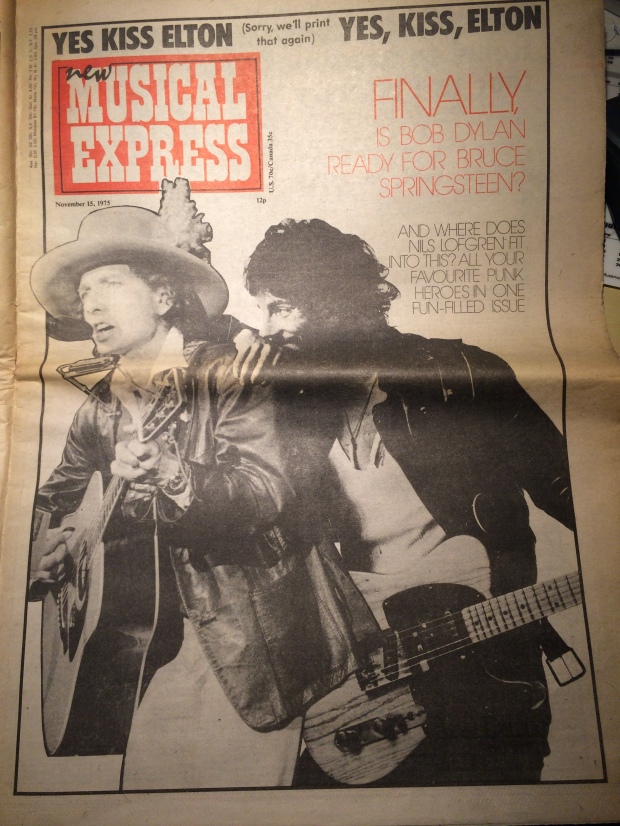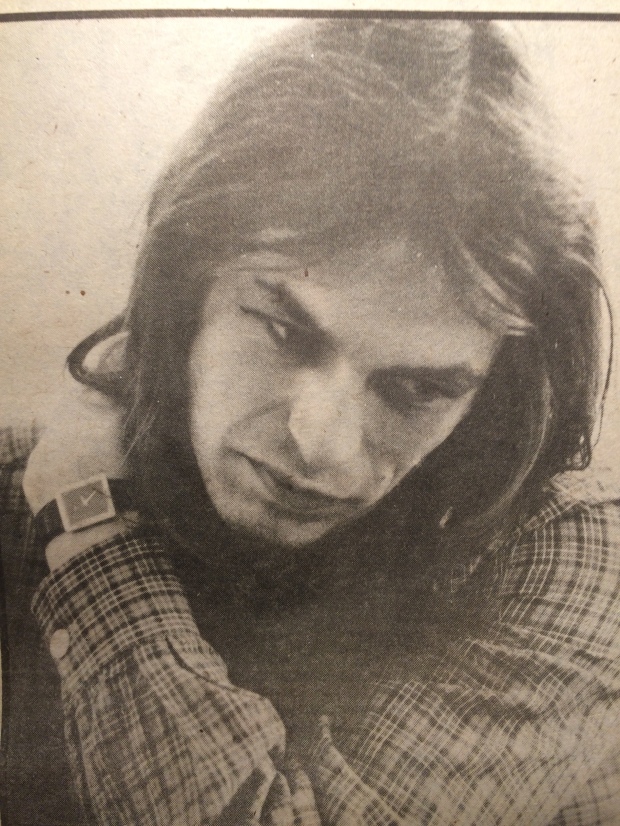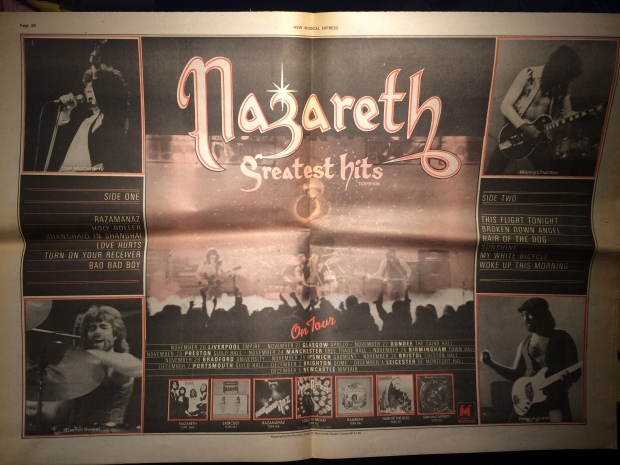Steve Howe is a very talented musician who have made just as many solo albums as he has made albums for Yes. This interview tells us the story regarding his first ever solo album called “Beginnings”. And as is customary with an artist belonging to a bigger band – we get to hear a lot about Yes too. Which is not a bad thing at all… Enjoy!

New music and old arguments
If it cost £40,000 to make it should be good. That`s Steve Howe`s solo album we`re talking about, the mysteries of which were partially unveiled to Steve Clarke along with more revelations from the Wakeman Affair.
Steve Howe`s cats are playing in the garden of his Hampstead home. His missus has gone off to collect one of the kids from school. And inside the tastefully furnished lounge, the master of the house is making with the verbals on the Yes – Wakeman split, just in case anybody still cares.
According to Howe, Wakeman wasn`t always learning his lines properly during his latter days with Yes. Or to be more precise, when it came to rehearsing that controversial Yes twin-set “Tales From Topographic Oceans”. Rick hadn`t exactly got the music down pat.
“You see,” says a disgruntled Howe, “we`d have a rehearsal and – I hate to say this – but he wouldn`t know what to play. Sure there was a lot of the music – four 20 minute pieces where you had to know all the chords inside out. And when this started to fall apart, when various parts of numbers didn`t quite hang together, we`d have this situation where four people would be looking across at one person going, C`mon, Rick!
“Rick almost realised that he`d cut himself too big a piece of the cake. He actually hadn`t rehearsed well enough, “claims Howe,” so obviously during the `Topographic Oceans` tour he became very unhappy, with himself and with Yes.
“But this is general with Yes. To start with learning `Roundabout` was a hell of a feat. Now of course we throw it off. It`s easy. The same would have happened if we carried on playing `Topographic Oceans.` It would be just as easy as playing `Relayer` is now.
“So there was this insufficiency of actual work before the tour. We found that side two of `Topographic Oceans` needed a lot of work from Rick and he couldn`t seem to contribute it. We thought Rick`s not rehearsing! He`s off out with his promotion men from A & M (Wakeman`s record company for solo releases).
“Obviously we didn`t talk to him.
“When that tour ended it had started to be felt within that Rick was gonna leave. Then he said he wasn`t, and then Yes decided that he should leave and then Rick said one more chance and we said, `Great! One more chance! Let`s rehearse this new album (“Relayer”) with him. And then, right at the last minute, he got up and said, `No, I don`t think I can go through with it.`
“I haven`t even seen him since then. He`s never called me. He didn`t even call me to say, `Good playing with you Steve, I`m not going to play with you anymore`. There`s been no contact at all.
“Rick certainly did talk about `Topographic Oceans` a lot with us although he never mentions this in anything he says. We all agreed to do that record.
“We were all crazy to do it.
“Rick gets upset if we even mention his name in the papers, which I think is unreasonable because if I can talk about one musician I should be able to talk about anybody without feeling I should watch my words – because he hasn`t watched his words as regards me.
“He hasn`t had to call me up or apologise or anything. So I feel we`re pretty even. I don`t feel he owes me anything. I don`t think I owe him anything at all. It was a very even situation where we know he tried and we know somewhere deep down inside he lost sight of what Yes were attempting to do.”
But surely Rick`s personality/lifestyle was far removed from the Yes lifestyle of You Know What?
“Initially it wasn`t. His humour was ours completely – Python and everything. Drinking wasn`t disallowed in Yes. It`s never been disallowed. What I`m saying is, because of extremes, because Rick did take things to extremes.
“He doesn`t have any trouble holding it but during the recording of `Topographic Oceans` he started to realise that none of us wanted to indulge.
“Everybody has fun. Everybody has vices. But when they`re talking to me, if they`re not talking honestly, constructively and creatively then they can sod off for all I`m concerned.
“I don`t really blame A & M Records `cause they`re a very nice record company. But they do a lot of geeing up with Rick, a lot of looking after him. We weren`t really getting that from Atlantic at that time. It was making a gap. I don`t think it was anything we created. We were waiting for him to come into the room – but no, he was out with A & M.
“Silly trivial little things like that instigated this gulf between us.”
So (gulp), did Rick turn up blotto for Yes rehearsals, Steve? “Jon could come in totally drunk and I`d be amused,” hedges Howe. “And most probable I`d put down my guitar and find something to do. If one can make use of one`s location or one`s state of mind it`s great. But with Rick it was a little bit different. He wouldn`t say, `I can`t do anything today,` but when the next day came we said, `What`s that tune you were playing yesterday, Rick? And he didn`t know. We knew we had a problem with Rick. There was this whole feeling that we were losing touch with the real Rick. He was putting on a show for us that we wanted so much to break down. He wouldn`t admit that he was making mistakes. He couldn`t talk about it.”
In fact one of the last remembrances Howe has of Wakeman was of the time when individual members of Yes were going into Morgan studios to add over-dubs to “Topographic Oceans”. Wakeman had just completed his session and was leaving the studio when Howe walked in.
“I`d just heard strains of `What Happened To That Song` just as I`d come in the door.” Howe recollects. “Rick was leaving. He said he`s finished. I asked him whether he`d put Mellotron on the last verse. He said he hadn`t, but he had finished. And he went out the door and I listened to his track. Rick hadn`t done anything at the end at all.”
So Howe substituted guitar for Wakeman`s mellotron.

Like I said before, Howe-Towers is in Hampstead. You know that salubrious part of London where a lot of 18th Century artists used to live, and where a lot of 20th century poseurs do live. And it`s a fairly modest abode when one considers the wealth that composing members of Yes must have collected over the years.
The carpet just avoids rubbing up against your crotch and instead of two stereo speakers, there`s four. It`s not a quad set-up though. Howe`s most recently played album, judging from the cover which rests ontop the low glass coffee table, is “Revolver”.
So you see, Steve Howe, while not living in Hefner-style opulence, isn`t short of a brown one or two. Why, his solo album – the real point of our visit – cost something like 40 grand to make. And “Topographic Oceans” clocked up 90 grand`s worth of studio time.
As a guitarist Howe knows an awesome amount, exploring many styles and going off at wild tangents one doesn`t normally associate with rock guitarists. In conversation he`s not the most economical of speakers, often coming on with an intense stream-of-consciousness type rap, fast-thinking his way from one subject to another without any prompting from your interviewer. I mean, our interview ended with Howe paying compliments to the music press. I hadn`t even brought up the subject.
But to “Beginnings”, Howe`s solo album and the first of a complete quintet of Yes solo elpees. Squire`s is next and the remaining three are promised for release early on in the new year. “Patrick and Alan are both in the final stages,” informs the guitarist, “And Jon`s well into the midst of it.” (Rumour has it that Alan White`s record is something of an R and B album, probably in contrast to the more grandiose aspirations of the other`s albums, if group contributions are anything to go by).
Howe reckons “Beginnings” is most definitely a rock album and the material (which will be featured on upcoming Yes tours) spans a wide time period. So why, really, did he make it?
“I`ve always planned to record my own material in its rawest state without any other – very helpful and objective – ideas on it. We`ve all made solo albums within the Yes context. `Topographic Oceans` was a concept that Jon and I presented to the band in the same way that I presented these songs to different performers.”
Musicians included on “Beginnings” are Moraz, White and ex-Yes drummer Bill Bruford. Howe, of course, plays guitar (and bass), sings and wrote all the material. Roger Dean (of course) designed the sleeve, it`s being marketed as a closely-affiliated Yes album.
Howe denies that the album is simply the indulgence of an affluent rock star. The theory is that every band has fans who get off on one instrument in particular, and the solo albums are aimed at those people.
Says Howe: “People who get off on the guitar should get off on this.”
He played me several tracks, and at least one of them convinced me that it is in fact Howe who is the lynch-pin of Yes. The music sounded overtly Yes-ish, although Howe`s own vocals bore no resemblance whatsoever to mountain stream purity of Anderson`s voice. (In fact they sounded a little like Jack Bruce`s).
The album was recorded over four months – longer than Howe originally envisaged. However, he had a free hand and there was no question of skimping. Eddie Offord receives a production credit, but Howe says Offord`s role wasn`t as great as it is in a Yes album, by virtue of the amount of energy Howe himself was expending.
Howe wrote his own lyrics, and, of course, he has contributed to Yes`s lyrics in the past.
“My style is quite different to Jon`s. He makes much greater use of vocabulary… he even surprises himself sometimes.
“If people who review Yes records are smart then they should be able to spot what I`ve written and what Jon`s written because we`re very different.”
It turns out that the title “Close To The Edge” itself was Howe`s idea, and he contributed extensively to the lyrics of “Topographic Oceans.”
He also came up with lyric ideas for “Relayer” – “I`d say something like `We go floating down the river`, and Jon would change that to `We go drifting down the streams` (the way it appears on the record).
“And there were my words `She won`t know what it means to me.` Jon changed that to `To Be Over`. So Jon with his creativity disguised it into something that you have to consider to be over. It was a much broader lyrical statement.”
Anderson`s lyrics have often been criticised. Howe defends them.
“If somebody says it`s a load of rubbish, I feel they`re not being true to their brains. Something like `A seasoned witch can call you from the depths of your disgrace` is an odd collection of words, yet the images fly off like sparks.
“That`s the idea. It`s better than a song that just says” – he half sings – “I went down the road and bought myself a packet of Rothmans`. With a lyric like `A seasoned witch` etc you`re considering disgrace, seasons… you`re considering a whole range of different things. To me it`s exciting, enlightening and that`s what progressive music should be about.
“I feel that `Long Tall Sally` was progressive music and can be played in a totally new way. The excitement Little Richard injected into something like “Jenny Jenny” passes on to us, and we write songs like `What Happened To This Song We Knew So Well` which is also a lyric of mine. So there you are, you have two things which aren`t that far removed.
“I feel that I could go on stage and play that number – `Jenny Jenny` or `What Happened To That Song` – and not feel that there`s that much difference. If I could live out all my fantasies like that I`d be touring with rock `n` roll bands one week and performing with brilliant guitarists like John Williams as much as I could.”

I have personally transcribed this from the original paper. If you have a music-related web-page where this fits – please make a link to the article. With a great, big thank you to the original writer of the article from all of us music fans!
This number of New Musical Express also contains articles/interviews with these people: Nils Lofgren, Pink Floyd, Syd Barrett, Bruce Springsteen, Elton John, Ivor Cutler, Kiss, Spud, John Cale.
This issue is sold!